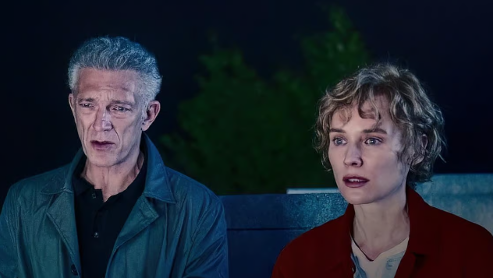THE SHROUDS

Cast: Vincent Cassel, Diane Kruger, Guy Pearce, Sandrine Holt, Elizabeth Saunders, Jennifer Dale, Eric Weinthal
Writer/Director: David Cronenberg
119 mins.
The deeply personal inspiration for this film was David Cronenberg’s grief over the death of his wife in 2017. The film’s opening credits sequence features an array of swirling dots that eventually form the outline of a woman. Allied with the insinuating low-pitched electronic droning of Howard Shore’s score, the sequence dissolves into a dreamy vision of a man looking into the prehistoric-looking underground surroundings of a nude female corpse, before the camera zooms right into the yelling man’s mouth and snaps us back into reality – as we see Karsh Relikh (Vincent Cassel) having his teeth inspected by his dentist, Dr. Hofstra (Eric Weinthal). We are in distinctly Cronenberg-style territory, with the director thrusting forbidding bodily imagery in front of us. Also, abundantly in dialogue scenes, important events are generally talked about rather than directly shown. The cinematography is almost unnerving in its digital clarity, with the film showing an alternately intrigued and critical fascination with the ways technology encroaches on humanity, a paranoid interest in rooting out underlying conspiracies.
Grief may be the starting point for what proliferates in The Shrouds, but Cronenberg has much more on his mind than that. Karsh’s response to the death of his wife, Becca (Diane Kruger), is to create GraveTech, a technology that allows people to monitor their loved ones’ corpses with the help of special shrouds—outfits with many tiny X-ray cameras embedded inside—that their bodies are kitted out with when they’re underground. When, one evening, a grave site featuring bodies buried with GraveTech, including Becca’s, is vandalised, he, with the help of a computer programmer, Maury (Guy Pearce), try to figure out who is responsible and why. In that sense, The Shrouds could be said to be a mystery tale—one that, to give the film even more of a topical flavour, it eventually involves the possibility of both Russians and Chinese interested in GraveTech. To some degree, the mystery elements are secondary to what’s primarily a study of a deeply troubled individual. Karsh is surrounded by technology. Not only does he owns a self-driving Tesla, but also uses a virtual personal assistant, named Hunny (voiced by Kruger), created by Maury to help keep his life in order. All the technology in the world, though, can’t console him in the wake of his great personal loss, as both an agonisingly awkward blind date early on and assorted dream sequences throughout the film demonstrate. Karsh eventually finds some solace in the company of two women: Soo-Min Szabo (Sandrine Holt), the blind wife of a Hungarian magnate and potential client on the verge of death, and, most perversely, Becca’s sister, Terry (Kruger yet again), who, it turns out, has a fetish for conspiracy theories. Karsh and Terry’s sex scene together constitutes the one genuine moment of heat in a film that’s otherwise noteworthy for its willed sterility. Maury’s presence adds another layer of romantic complication, since he’s Terry’s ex-husband. Cronenberg observes all of this with an eerie calm and if you’re willing to go along with his deliberate flow, there are plenty of intellectual and emotional connections to be made.
The Shrouds offers a cautionary tale of the limits of technology in dealing with complex human emotions, especially when such technology can be so easily manipulated by outside forces—personal, multi-national, or otherwise. Even more disquieting is the writer/director’s refusal to pass easy judgment on Karsh. There’s a romanticism to Karsh’s stated desire to be buried next to his wife in his graveyard even as there’s a grotesqueness in his obsession with using his technology to glimpse her bones. The Shrouds is clearly willing to dive headfirst into the depths of twisted human desire even if the ending is more than a little obtuse.